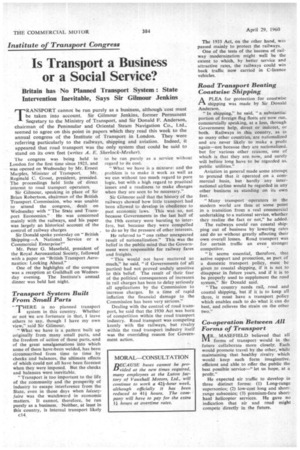Is Transport a Business or a Social Service?
Page 52

If you've noticed an error in this article please click here to report it so we can fix it.
Britain has No Planned Transport System : State Intervention Inevitable, Says Sir Gilmour Jenkins
rrRANSPORT cannot be run purely as a business, although cost must be taken into account. Sir Gilmour Jenkins, former Permanent Secretary to the Ministry of Transport, and Sir Donald F. Anderson, chairman, of the Peninsular and Oriental Steam Navigation Co., Ltd., seemed W agree on this point in papers which they read this week to the annual congress of the Institute of Transport in London. They were referring particularly to the railways, shipping and aviation. Indeed, it appeared that road transport was the only system that could be said to stand on its own feet (writes A. E. Sherlock-Mesher).
The congress was being held in London for the first time since 1925, and was opened on Wednesday by Mr. Ernest Marples, Minister of Transport. Mr. Reginald C. Grout, president, presided. The proceedings held little of direct interest to road transport operators. Sir Gilmour, speaking in place of Sir Brian Robertson, chairman of the British Transport Commission, who was unable to attend the congress, dealt on Wednesday with "The State and Transport Economics." He was concerned mainly with the railways, and his paper was largely an historical account of the control of railway charges. Sir Donald spoke yesterday on " British Shipping—A National Service or a Commercial Enterprise?"
Mr. Peter G. Masefield, president of the Royal Aeronautical Society, followed with a paper on "British Transport Aeronautics: Looking Ahead."
One of the highlights of the congress was a reception at Guildhall on Wednesday evening. The Institute's annual dinner was held last night.
Transport System Built From Small Parts
" THERE is no planned transport system in this country. Whether or not we are fortunate in that, I leave others to say, though I have my own view," said Sir Gilmour.
"What we have is a pattern built up originally from many small parts, and the freedom of action of those parts,•and of the great amalgamations into which some of them have ebeen welded, has been circumscribed from time to time by checks and balances, the ultimate effects of which could not all have been forecast when they were imposed. But the checks and balances were inevitable.
"Transport is too important to the life of the community and the prosperity of industry to escape interference from the State, even in those days when laissezfaire was the watchword in economic matters. It cannot, therefore, be run purely as a business. Neither, at least in this country, is internal transport likely
c 14
to he run purely as a service without regard to its cost. "What we have is a mixture: and the problem is to make it work as well as we can without too much regard to pure logic, but with a high regard to practical issues and a readiness to make changes when they arc seen to be necessary." Sir Gilmour said that the history of the railways showed how little transport had been allowed to develop in obedience to past economic laws. This was so, not because Governments in the last half of the 19th century were bursting to interfere, but because they were compelled to do so by the pressure of other interests. He referred to " one rather unexpected result of nationalization." This was the belief in the public mind that the Government were responsible for railway fares and freights. "This would not have mattered so much," he said, "it Governments (of all parties) had not proved unduly sensitive to this belief. The result of their fear of the political consequences of increases in rail charges has been to delay seriously all applications by the Commission to increase charges, In a time of rapid inflation the financial damage to the Commission has been very serious." Dealing with the control of road transport, he said that the 1930 Act was born of competition within the road transport industry. Road transport was competing keenly with the railways, but rivalry within the road transport industry itself was the overriding reason for Government action.
The 1933 Act, on the other hand, was passed mainly to protect the railways.
One of the tests of the 'success of railway modernization might well be the extent to which, by better service and attractive rates, the railways could win back traffic now carried in C-licence vehicles.












































































































